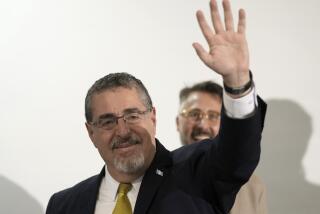U.N. Help for Central America
- Share via
During the interim between Ronald Reagan’s departure from the White House and the start of the new Bush Administration, leaders of Central America’s five war-weary nations have been trying to revive a stalled peace process in their region. They did it this week.
Displaying a unanimity they have not shown for years, foreign ministers of Guatemala, Honduras, El Salvador, Nicaragua and Costa Rica met with U.N. Secretary General Javier Perez de Cuellar and asked him to draw up plans for sending international military observers to the isthmus. The observers--from Canada, Spain and West Germany--would be charged with monitoring compliance with a peace plan that the Central Americans have been struggling to implement since late 1987.
That peace plan was initially drawn up by Costa Rican President Oscar Arias Sanchez. It calls on the five nations to negotiate cease-fires with rebel groups, stop guerrillas from using their territory to mount military operations against other nations, and restore democratic freedoms to their citizens. Because it is the work of Central Americans, the Arias Plan is still the most viable means of trying to restore peace to a region where a series of brush-fire wars have killed 100,000 people in the last decade. It certainly offers a better option than the military strategy stubbornly pursued by Reagan, who poured billions of dollars into a civil war in El Salvador and a covert war against Nicaragua with little success.
There are still difficulties to be overcome before the Arias Plan is fully implemented. It could take a month to get peace monitors in place, and longer to get highly nationalistic military castes in El Salvador, Honduras and Nicaragua to cooperate with them. And there is still the question of how the Central Americans will verify compliance with the peace plan’s provisions for political freedom. But an important first step has been taken. The United Nations should do all it can to keep the process moving, and the United States must not interfere.
More to Read
Sign up for Essential California
The most important California stories and recommendations in your inbox every morning.
You may occasionally receive promotional content from the Los Angeles Times.










